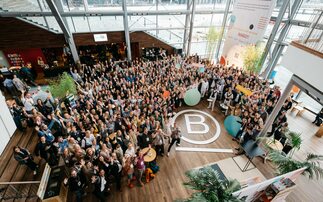Businesses are aware of the UN's ambitious new development goals, but are they developing coherent strategies to ensure they are met?
Businesses will this weekend be urged to take up a leadership role in ensuring the United Nations new Sustainable Development Goals (SDG) are met, as over 150 world leaders arrive in New York to ratify the landmark targets.
The UN is to formally adopt the set of 17 new development goals for 2030, replacing the Millennium Development Goals (MDGs) that are due to expire this year. The new goals, which are backed by 169 specific targets, have been developed in conjunction with business and civil society leaders and unlike the MDGs include a range of environmental goals, including commitments to "combat climate change", protect marine and terrestrial ecosystems, promote sustainable agriculture and water management, and "ensure access to affordable, reliable, sustainable and modern energy for all".
Speaking ahead of the summit, UN Secretary-General Ban Ki-moon said the goals represented a "universal, transformative and integrated agenda that heralds an historic turning point for our world", adding that the new approach had at its core a desire to "ensure peace and prosperity and forge partnerships with people and planet".
Business leaders this week united in praising the goals, arguing they would help mobilise investment, create new markets, reduce environmental risks, and increase the chances of an international climate change agreement being reached at this December's UN climate summit in Paris.
However, leading figures warned businesses needed to take urgent steps to develop strategies to meet the targets or risk them being missed.
Recent research by the Overseas Development Institute (ODI) highlighted how each of the SDGs will require a considerable departure from business-as-usual development patterns if they are to be met. The group assessed all 17 goals and gave them an A to F grade based on the pace of progress that is currently being made towards the target. None of the goals received an A grade suggesting the world was currently on track to meet them, while five of the goals, including climate change, ocean protection, and waste management, were awarded an F grade, implying current trends are moving in the wrong direction.
Speaking to BusinessGreen, Paul Polman, chief executive of Unilever and an adviser on the SDGs, said the onus was on businesses to help ensure these trends are reversed and the new targets are met.
"Business has played an important part in shaping the new SDGs and it will therefore play an important role in realising it," he said. "But what's increasingly clear is that we need more businesses to embrace the sustainable development agenda and treat it as an important driver of core business strategies and investment decisions. Sustainable business models are vital to long-term inclusive growth and value creation. Our voice, and our leadership, in supporting governments to take decisive action on implementing the SDGs is paramount. And our actions send market signals that the world really can change path, and business leaders are committed to making it happen."
His comments were echoed by the B Team group of business leaders, which includes Polman, as well as Virgin boss Sir Richard Branson and former Puma chief executive Jochen Zeitz. The group yesterday called for the creation of an international "business plan" to support the goals and "hasten the transition toward a thriving and just net-zero emissions economy".
Specifically, the group is calling for business leaders to work with governments to make the economic case for meeting the goals, for companies to set and report on corporate objectives based on the SDGs, and for governments to "enact national implementation plans, a robust financing and investment architecture and ambitious policies that will support businesses to advance the Global Goals".
Branson said the goals represented an "historic opportunity" to end poverty and tackle global environmental challenges, but warned it would only be realised if businesses work together. "The Global Goals require action by all countries, all companies and all citizens," he said. "It's great to see world leaders stand up for the transformation we urgently need. Now it's time for business leaders across the world to play their part, scale up action, and make the goals a reality, learn about the Global Goals here, and make a plan for how you can address them."









